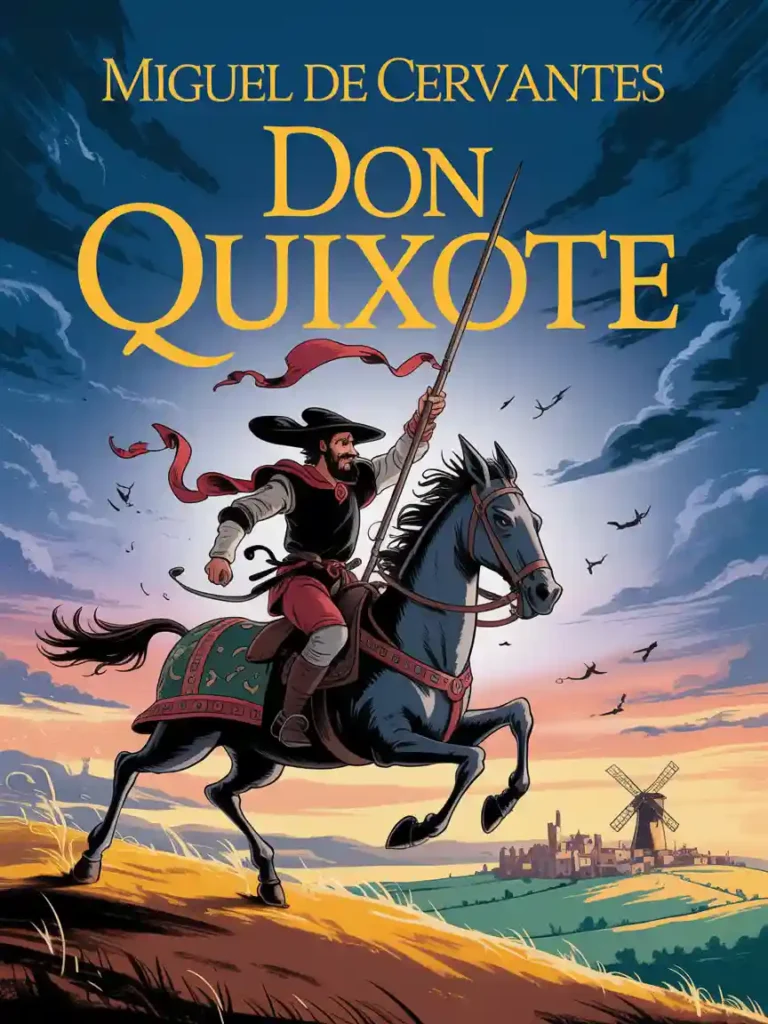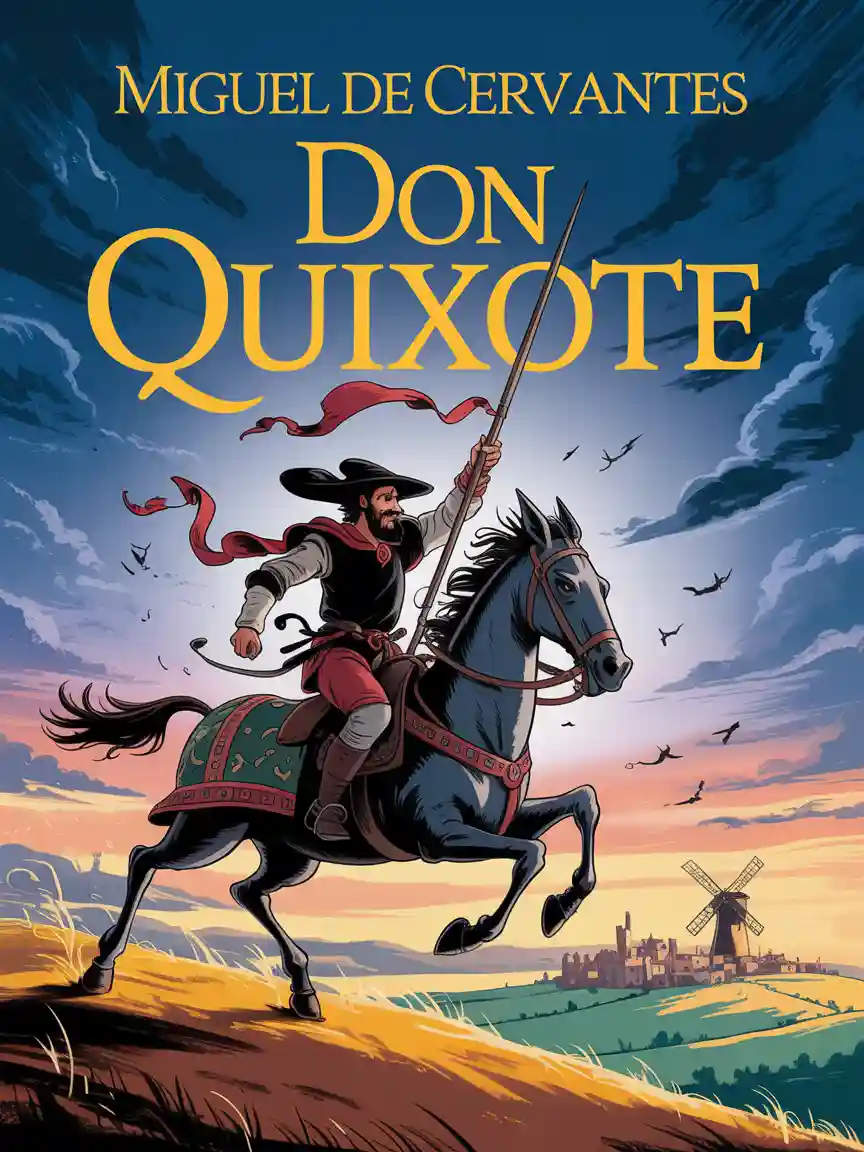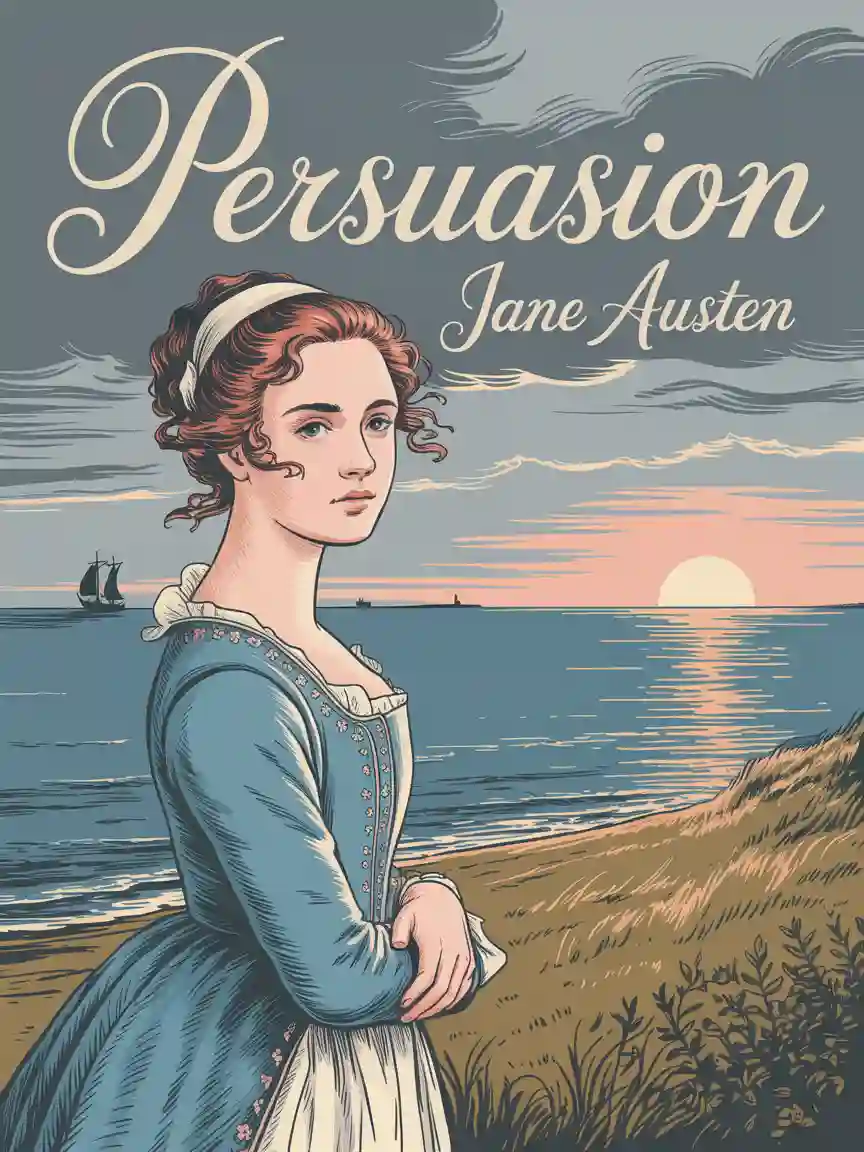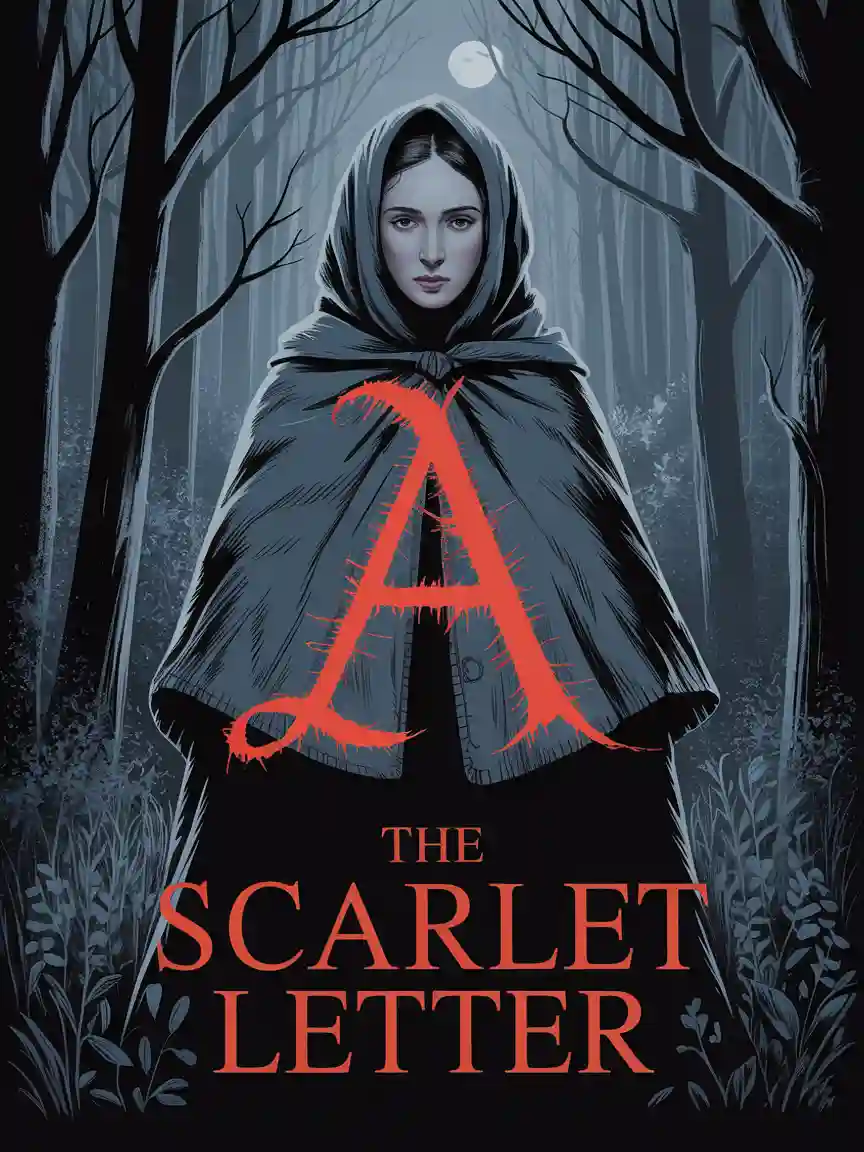CHAPTER 52
OF THE QUARREL THAT DON QUIXOTE HAD WITH THE GOATHERD, TOGETHER WITH
THE RARE ADVENTURE OF THE PENITENTS, WHICH WITH AN EXPENDITURE OF SWEAT
HE BROUGHT TO A HAPPY CONCLUSION
The goatherd’s tale gave great satisfaction to all the hearers, and the
canon especially enjoyed it, for he had remarked with particular attention
the manner in which it had been told, which was as unlike the manner of a
clownish goatherd as it was like that of a polished city wit; and he observed
that the curate had been quite right in saying that the woods bred men of
learning. They all offered their services to Eugenio but he who showed him-
self most liberal in this way was Don Quixote, who said to him, “Most as-
suredly, brother goatherd, if I found myself in a position to attempt any ad-
venture, I would, this very instant, set out on your behalf, and would rescue
Leandra from that convent (where no doubt she is kept against her will), in
spite of the abbess and all who might try to prevent me, and would place
her in your hands to deal with her according to your will and pleasure, ob-
serving, however, the laws of chivalry which lay down that no violence of
any kind is to be offered to any damsel. But I trust in God our Lord that the
might of one malignant enchanter may not prove so great but that the power
of another better disposed may prove superior to it, and then I promise you
my support and assistance, as I am bound to do by my profession, which is
none other than to give aid to the weak and needy.”
The goatherd eyed him, and noticing Don Quixote’s sorry appearance and
looks, he was filled with wonder, and asked the barber, who was next him,
“Senor, who is this man who makes such a figure and talks in such a
strain?”
“Who should it be,” said the barber, “but the famous Don Quixote of La
Mancha, the undoer of injustice, the righter of wrongs, the protector of
damsels, the terror of giants, and the winner of battles?”
“That,” said the goatherd, “sounds like what one reads in the books of the
knights-errant, who did all that you say this man does; though it is my belief
that either you are joking, or else this gentleman has empty lodgings in his
head.”
“You are a great scoundrel,” said Don Quixote, “and it is you who are
empty and a fool. I am fuller than ever was the whoreson bitch that bore
you;” and passing from words to deeds, he caught up a loaf that was near
him and sent it full in the goatherd’s face, with such force that he flattened
his nose; but the goatherd, who did not understand jokes, and found himself
roughly handled in such good earnest, paying no respect to carpet, table-
cloth, or diners, sprang upon Don Quixote, and seizing him by the throat
with both hands would no doubt have throttled him, had not Sancho Panza
that instant come to the rescue, and grasping him by the shoulders flung him
down on the table, smashing plates, breaking glasses, and upsetting and
scattering everything on it. Don Quixote, finding himself free, strove to get
on top of the goatherd, who, with his face covered with blood, and soundly
kicked by Sancho, was on all fours feeling about for one of the table-knives
to take a bloody revenge with. The canon and the curate, however, prevent-
ed him, but the barber so contrived it that he got Don Quixote under him,
and rained down upon him such a shower of fisticuffs that the poor knight’s
face streamed with blood as freely as his own. The canon and the curate
were bursting with laughter, the officers were capering with delight, and
both the one and the other hissed them on as they do dogs that are worrying
one another in a fight. Sancho alone was frantic, for he could not free him-
self from the grasp of one of the canon’s servants, who kept him from going
to his master’s assistance.
At last, while they were all, with the exception of the two bruisers who
were mauling each other, in high glee and enjoyment, they heard a trumpet
sound a note so doleful that it made them all look in the direction whence
the sound seemed to come. But the one that was most excited by hearing it
was Don Quixote, who though sorely against his will he was under the
goatherd, and something more than pretty well pummelled, said to him,
“Brother devil (for it is impossible but that thou must be one since thou hast
had might and strength enough to overcome mine), I ask thee to agree to a
truce for but one hour for the solemn note of yonder trumpet that falls on
our ears seems to me to summon me to some new adventure.” The goatherd,
who was by this time tired of pummelling and being pummelled, released
him at once, and Don Quixote rising to his feet and turning his eyes to the
quarter where the sound had been heard, suddenly saw coming down the
slope of a hill several men clad in white like penitents.
The fact was that the clouds had that year withheld their moisture from
the earth, and in all the villages of the district they were organising proces-
sions, rogations, and penances, imploring God to open the hands of his mer-
cy and send the rain; and to this end the people of a village that was hard by
were going in procession to a holy hermitage there was on one side of that
valley. Don Quixote when he saw the strange garb of the penitents, without
reflecting how often he had seen it before, took it into his head that this was
a case of adventure, and that it fell to him alone as a knight-errant to engage
in it; and he was all the more confirmed in this notion, by the idea that an
image draped in black they had with them was some illustrious lady that
these villains and discourteous thieves were carrying off by force. As soon
as this occurred to him he ran with all speed to Rocinante who was grazing
at large, and taking the bridle and the buckler from the saddle-bow, he had
him bridled in an instant, and calling to Sancho for his sword he mounted
Rocinante, braced his buckler on his arm, and in a loud voice exclaimed to
those who stood by, “Now, noble company, ye shall see how important it is
that there should be knights in the world professing the of knight-errantry;
now, I say, ye shall see, by the deliverance of that worthy lady who is borne
captive there, whether knights-errant deserve to be held in estimation,” and
so saying he brought his legs to bear on Rocinante—for he had no spurs—
and at a full canter (for in all this veracious history we never read of Roci-
nante fairly galloping) set off to encounter the penitents, though the curate,
the canon, and the barber ran to prevent him. But it was out of their power,
nor did he even stop for the shouts of Sancho calling after him, “Where are
you going, Senor Don Quixote? What devils have possessed you to set you
on against our Catholic faith? Plague take me! mind, that is a procession of
penitents, and the lady they are carrying on that stand there is the blessed
image of the immaculate Virgin. Take care what you are doing, senor, for
this time it may be safely said you don’t know what you are about.” Sancho
laboured in vain, for his master was so bent on coming to quarters with
these sheeted figures and releasing the lady in black that he did not hear a
word; and even had he heard, he would not have turned back if the king had
ordered him. He came up with the procession and reined in Rocinante, who
was already anxious enough to slacken speed a little, and in a hoarse, excit-
ed voice he exclaimed, “You who hide your faces, perhaps because you are
not good subjects, pay attention and listen to what I am about to say to
you.” The first to halt were those who were carrying the image, and one of
the four ecclesiastics who were chanting the Litany, struck by the strange
figure of Don Quixote, the leanness of Rocinante, and the other ludicrous
peculiarities he observed, said in reply to him, “Brother, if you have any-
thing to say to us say it quickly, for these brethren are whipping themselves,
and we cannot stop, nor is it reasonable we should stop to hear anything,
unless indeed it is short enough to be said in two words.”
“I will say it in one,” replied Don Quixote, “and it is this; that at once,
this very instant, ye release that fair lady whose tears and sad aspect show
plainly that ye are carrying her off against her will, and that ye have com-
mitted some scandalous outrage against her; and I, who was born into the
world to redress all such like wrongs, will not permit you to advance anoth-
er step until you have restored to her the liberty she pines for and deserves.”
From these words all the hearers concluded that he must be a madman,
and began to laugh heartily, and their laughter acted like gunpowder on Don
Quixote’s fury, for drawing his sword without another word he made a rush
at the stand. One of those who supported it, leaving the burden to his com-
rades, advanced to meet him, flourishing a forked stick that he had for prop-
ping up the stand when resting, and with this he caught a mighty cut Don
Quixote made at him that severed it in two; but with the portion that re-
mained in his hand he dealt such a thwack on the shoulder of Don Quixote’s
sword arm (which the buckler could not protect against the clownish as-
sault) that poor Don Quixote came to the ground in a sad plight.
Sancho Panza, who was coming on close behind puffing and blowing,
seeing him fall, cried out to his assailant not to strike him again, for he was
poor enchanted knight, who had never harmed anyone all the days of his
life; but what checked the clown was, not Sancho’s shouting, but seeing that
Don Quixote did not stir hand or foot; and so, fancying he had killed him,
he hastily hitched up his tunic under his girdle and took to his heels across
the country like a deer.
By this time all Don Quixote’s companions had come up to where he lay;
but the processionists seeing them come running, and with them the officers
of the Brotherhood with their crossbows, apprehended mischief, and clus-
tering round the image, raised their hoods, and grasped their scourges, as
the priests did their tapers, and awaited the attack, resolved to defend them-
selves and even to take the offensive against their assailants if they could.
Fortune, however, arranged the matter better than they expected, for all
Sancho did was to fling himself on his master’s body, raising over him the
most doleful and laughable lamentation that ever was heard, for he believed
he was dead. The curate was known to another curate who walked in the
procession, and their recognition of one another set at rest the apprehen-
sions of both parties; the first then told the other in two words who Don
Quixote was, and he and the whole troop of penitents went to see if the poor
gentleman was dead, and heard Sancho Panza saying, with tears in his eyes,
“Oh flower of chivalry, that with one blow of a stick hast ended the course
of thy well-spent life! Oh pride of thy race, honour and glory of all La Man-
cha, nay, of all the world, that for want of thee will be full of evil-doers, no
longer in fear of punishment for their misdeeds! Oh thou, generous above
all the Alexanders, since for only eight months of service thou hast given
me the best island the sea girds or surrounds! Humble with the proud,
haughty with the humble, encounterer of dangers, endurer of outrages, en-
amoured without reason, imitator of the good, scourge of the wicked, ene-
my of the mean, in short, knight-errant, which is all that can be said!”
At the cries and moans of Sancho, Don Quixote came to himself, and the
first word he said was, “He who lives separated from you, sweetest Dul-
cinea, has greater miseries to endure than these. Aid me, friend Sancho, to
mount the enchanted cart, for I am not in a condition to press the saddle of
Rocinante, as this shoulder is all knocked to pieces.”
“That I will do with all my heart, senor,” said Sancho; “and let us return
to our village with these gentlemen, who seek your good, and there we will
prepare for making another sally, which may turn out more profitable and
creditable to us.”
“Thou art right, Sancho,” returned Don Quixote; “It will be wise to let the
malign influence of the stars which now prevails pass off.”
The canon, the curate, and the barber told him he would act very wisely
in doing as he said; and so, highly amused at Sancho Panza’s simplicities,
they placed Don Quixote in the cart as before. The procession once more
formed itself in order and proceeded on its road; the goatherd took his leave
of the party; the officers of the Brotherhood declined to go any farther, and
the curate paid them what was due to them; the canon begged the curate to
let him know how Don Quixote did, whether he was cured of his madness
or still suffered from it, and then begged leave to continue his journey; in
short, they all separated and went their ways, leaving to themselves the cu-
rate and the barber, Don Quixote, Sancho Panza, and the good Rocinante,
who regarded everything with as great resignation as his master. The carter
yoked his oxen and made Don Quixote comfortable on a truss of hay, and at
his usual deliberate pace took the road the curate directed, and at the end of
six days they reached Don Quixote’s village, and entered it about the middle
of the day, which it so happened was a Sunday, and the people were all in
the plaza, through which Don Quixote’s cart passed. They all flocked to see
what was in the cart, and when they recognised their townsman they were
filled with amazement, and a boy ran off to bring the news to his house-
keeper and his niece that their master and uncle had come back all lean and
yellow and stretched on a truss of hay on an ox-cart. It was piteous to hear
the cries the two good ladies raised, how they beat their breasts and poured
out fresh maledictions on those accursed books of chivalry; all which was
renewed when they saw Don Quixote coming in at the gate.
At the news of Don Quixote’s arrival Sancho Panza’s wife came running,
for she by this time knew that her husband had gone away with him as his
squire, and on seeing Sancho, the first thing she asked him was if the ass
was well. Sancho replied that he was, better than his master was.
“Thanks be to God,” said she, “for being so good to me; but now tell me,
my friend, what have you made by your squirings? What gown have you
brought me back? What shoes for your children?”
“I bring nothing of that sort, wife,” said Sancho; “though I bring other
things of more consequence and value.”
“I am very glad of that,” returned his wife; “show me these things of
more value and consequence, my friend; for I want to see them to cheer my
heart that has been so sad and heavy all these ages that you have been
away.”
“I will show them to you at home, wife,” said Sancho; “be content for the
present; for if it please God that we should again go on our travels in search
of adventures, you will soon see me a count, or governor of an island, and
that not one of those everyday ones, but the best that is to be had.”
“Heaven grant it, husband,” said she, “for indeed we have need of it. But
tell me, what’s this about islands, for I don’t understand it?”
“Honey is not for the mouth of the ass,” returned Sancho; “all in good
time thou shalt see, wife—nay, thou wilt be surprised to hear thyself called
‘your ladyship’ by all thy vassals.”
“What are you talking about, Sancho, with your ladyships, islands, and
vassals?” returned Teresa Panza—for so Sancho’s wife was called, though
they were not relations, for in La Mancha it is customary for wives to take
their husbands’ surnames.
“Don’t be in such a hurry to know all this, Teresa,” said Sancho; “it is
enough that I am telling you the truth, so shut your mouth. But I may tell
you this much by the way, that there is nothing in the world more delightful
than to be a person of consideration, squire to a knight-errant, and a seeker
of adventures. To be sure most of those one finds do not end as pleasantly as
one could wish, for out of a hundred, ninety-nine will turn out cross and
contrary. I know it by experience, for out of some I came blanketed, and out
of others belaboured. Still, for all that, it is a fine thing to be on the look-out
for what may happen, crossing mountains, searching woods, climbing
rocks, visiting castles, putting up at inns, all at free quarters, and devil take
the maravedi to pay.”
While this conversation passed between Sancho Panza and his wife, Don
Quixote’s housekeeper and niece took him in and undressed him and laid
him in his old bed. He eyed them askance, and could not make out where he
was. The curate charged his niece to be very careful to make her uncle com-
fortable and to keep a watch over him lest he should make his escape from
them again, telling her what they had been obliged to do to bring him home.
On this the pair once more lifted up their voices and renewed their maledic-
tions upon the books of chivalry, and implored heaven to plunge the authors
of such lies and nonsense into the midst of the bottomless pit. They were, in
short, kept in anxiety and dread lest their uncle and master should give them
the slip the moment he found himself somewhat better, and as they feared
so it fell out.
But the author of this history, though he has devoted research and indus-
try to the discovery of the deeds achieved by Don Quixote in his third sally,
has been unable to obtain any information respecting them, at any rate de-
rived from authentic documents; tradition has merely preserved in the mem-
ory of La Mancha the fact that Don Quixote, the third time he sallied forth
from his home, betook himself to Saragossa, where he was present at some
famous jousts which came off in that city, and that he had adventures there
worthy of his valour and high intelligence. Of his end and death he could
learn no particulars, nor would he have ascertained it or known of it, if good
fortune had not produced an old physician for him who had in his posses-
sion a leaden box, which, according to his account, had been discovered
among the crumbling foundations of an ancient hermitage that was being
rebuilt; in which box were found certain parchment manuscripts in Gothic
character, but in Castilian verse, containing many of his achievements, and
setting forth the beauty of Dulcinea, the form of Rocinante, the fidelity of
Sancho Panza, and the burial of Don Quixote himself, together with sundry
epitaphs and eulogies on his life and character; but all that could be read
and deciphered were those which the trustworthy author of this new and un-
paralleled history here presents. And the said author asks of those that shall
read it nothing in return for the vast toil which it has cost him in examining
and searching the Manchegan archives in order to bring it to light, save that
they give him the same credit that people of sense give to the books of
chivalry that pervade the world and are so popular; for with this he will
consider himself amply paid and fully satisfied, and will be encouraged to
seek out and produce other histories, if not as truthful, at least equal in in-
vention and not less entertaining. The first words written on the parchment
found in the leaden box were these:
THE ACADEMICIANS OF ARGAMASILLA, A VILLAGE OF LA
MANCHA, ON THE LIFE AND DEATH OF DON QUIXOTE OF LA
MANCHA, HOC SCRIPSERUNT MONICONGO, ACADEMICIAN OF
ARGAMASILLA,
ON THE TOMB OF DON QUIXOTE EPITAPH
{verse
The scatterbrain that gave La Mancha more
Rich spoils than Jason’s; who a point so keen
Had to his wit, and happier far had been
If his wit’s weathercock a blunter bore;
The arm renowned far as Gaeta’s shore,
Cathay, and all the lands that lie between;
The muse discreet and terrible in mien
As ever wrote on brass in days of yore;
He who surpassed the Amadises all,
And who as naught the Galaors accounted,
Supported by his love and gallantry:
Who made the Belianises sing small,
And sought renown on Rocinante mounted;
Here, underneath this cold stone, doth he lie.
{verse
PANIAGUADO, ACADEMICIAN OF ARGAMASILLA, IN LAUDEM
DULCINEAE DEL TOBOSO
SONNET
{verse
She, whose full features may be here descried,
High-bosomed, with a bearing of disdain,
Is Dulcinea, she for whom in vain
The great Don Quixote of La Mancha sighed.
For her, Toboso’s queen, from side to side
He traversed the grim sierra, the champaign
Of Aranjuez, and Montiel’s famous plain:
On Rocinante oft a weary ride.
Malignant planets, cruel destiny,
Pursued them both, the fair Manchegan dame,
And the unconquered star of chivalry.
Nor youth nor beauty saved her from the claim
Of death; he paid love’s bitter penalty,
And left the marble to preserve his name.
{verse
CAPRICHOSO, A MOST ACUTE ACADEMICIAN OF ARGA-
MASILLA, IN PRAISE OF ROCINANTE, STEED OF DON QUIXOTE
OF LA MANCHA
SONNET
{verse
On that proud throne of diamantine sheen,
Which the blood-reeking feet of Mars degrade,
The mad Manchegan’s banner now hath been
By him in all its bravery displayed.
There hath he hung his arms and trenchant blade
Wherewith, achieving deeds till now unseen,
He slays, lays low, cleaves, hews; but art hath made
A novel style for our new paladin.
If Amadis be the proud boast of Gaul,
If by his progeny the fame of Greece
Through all the regions of the earth be spread,
Great Quixote crowned in grim Bellona’s hall
To-day exalts La Mancha over these,
And above Greece or Gaul she holds her head.
Nor ends his glory here, for his good steed
Doth Brillador and Bayard far exceed;
As mettled steeds compared with Rocinante,
The reputation they have won is scanty.
{verse
BURLADOR, ACADEMICIAN OF ARGAMASILLA, ON SANCHO
PANZA
SONNET
{verse
The worthy Sancho Panza here you see;
A great soul once was in that body small,
Nor was there squire upon this earthly ball
So plain and simple, or of guile so free.
Within an ace of being Count was he,
And would have been but for the spite and gall
Of this vile age, mean and illiberal,
That cannot even let a donkey be.
For mounted on an ass (excuse the word),
By Rocinante’s side this gentle squire
Was wont his wandering master to attend.
Delusive hopes that lure the common herd
With promises of ease, the heart’s desire,
In shadows, dreams, and smoke ye always end.
{verse
CACHIDIABLO, ACADEMICIAN OF ARGAMASILLA, ON THE
TOMB OF DON QUIXOTE EPITAPH
{verse
The knight lies here below,
Ill-errant and bruised sore,
Whom Rocinante bore
In his wanderings to and fro.
By the side of the knight is laid
Stolid man Sancho too,
Than whom a squire more true
Was not in the esquire trade.
{verse
TIQUITOC, ACADEMICIAN OF ARGAMASILLA, ON THE TOMB
OF DULCINEA DEL TOBOSO
EPITAPH
{verse
Here Dulcinea lies.
Plump was she and robust:
Now she is ashes and dust:
The end of all flesh that dies.
A lady of high degree,
With the port of a lofty dame,
And the great Don Quixote’s flame,
And the pride of her village was she.
{verse
These were all the verses that could be deciphered; the rest, the writing
being worm-eaten, were handed over to one of the Academicians to make
out their meaning conjecturally. We have been informed that at the cost of
many sleepless nights and much toil he has succeeded, and that he means to
publish them in hopes of Don Quixote’s third sally.
“Forse altro cantera con miglior plectro.”
PART 2
TO THE COUNT OF LEMOS:
These days past, when sending Your Excellency my plays, that had ap-
peared in print before being shown on the stage, I said, if I remember well,
that Don Quixote was putting on his spurs to go and render homage to Your
Excellency. Now I say that “with his spurs, he is on his way.” Should he
reach destination methinks I shall have rendered some service to Your Ex-
cellency, as from many parts I am urged to send him off, so as to dispel the
loathing and disgust caused by another Don Quixote who, under the name
of Second Part, has run masquerading through the whole world. And he
who has shown the greatest longing for him has been the great Emperor of
China, who wrote me a letter in Chinese a month ago and sent it by a spe-
cial courier. He asked me, or to be truthful, he begged me to send him Don
Quixote, for he intended to found a college where the Spanish tongue would
be taught, and it was his wish that the book to be read should be the History
of Don Quixote. He also added that I should go and be the rector of this col-
lege. I asked the bearer if His Majesty had afforded a sum in aid of my trav-
el expenses. He answered, “No, not even in thought.”
“Then, brother,” I replied, “you can return to your China, post haste or at
whatever haste you are bound to go, as I am not fit for so long a travel and,
besides being ill, I am very much without money, while Emperor for Em-
peror and Monarch for Monarch, I have at Naples the great Count of
Lemos, who, without so many petty titles of colleges and rectorships, sus-
tains me, protects me and does me more favour than I can wish for.”
Thus I gave him his leave and I beg mine from you, offering Your Excel-
lency the “Trabajos de Persiles y Sigismunda,” a book I shall finish within
four months, Deo volente, and which will be either the worst or the best that
has been composed in our language, I mean of those intended for entertain-
ment; at which I repent of having called it the worst, for, in the opinion of
friends, it is bound to attain the summit of possible quality. May Your Ex-
cellency return in such health that is wished you; Persiles will be ready to
kiss your hand and I your feet, being as I am, Your Excellency’s most hum-
ble servant.
From Madrid, this last day of October of the year one thousand six hun-
dred and fifteen.
At the service of Your Excellency:
MIGUEL DE CERVANTES SAAVEDRA





